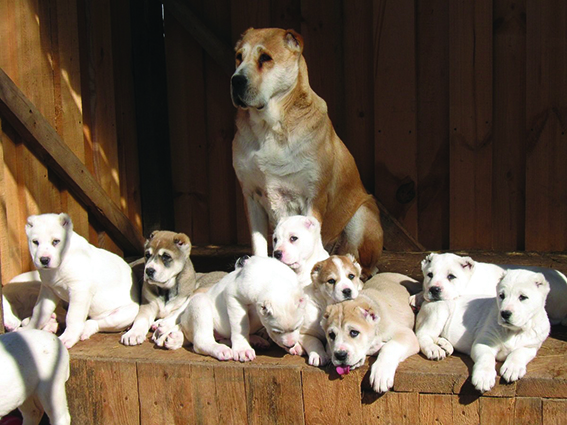What breed of man’s best friend won the hearts of 5 million Turkmens? Big, furry, calm as God, but shaped like a beast? It’s the Turkmen Alabai.
In Turkmen, Ala means patchy, variegated or multicolored if you will. Bay, in this case, means rich as in terms of very rich. These wonderful gentle giant monsters are exceptionally cool, reserved and intelligent, yet they are the lonely beastly lions of the Garagum (Black sand) deserts. If you cross their territory, they turn into predatory bear assassins with a point of no return.
They are not categorically disposed towards people and only accept their own immediate family. It’s more of a partner in crime type relationship. They are the ‘keep your distance’ type of dogs, although, if they would be bred as friendly home pets, I imagine they’d be the Saint Bernards of Turkmenistan. Alas, I haven’t met a Turkmen that has considered that option, although, once we owned a part Alabai and desert wolf, who we named JJ. He loved to run away and roam free around the herds of our neighbor’s cows on Petit Jean Mountain in Arkansas. He also loved meeting anyone, be it human, animal, or insect. He loved life, but he didn’t like the water, wouldn’t even dip his paws in it. His amicable nature also became his doom in Ghana, where we lived for almost 2 years. To our dismay, he was poisoned, possibly by burglars at night. So, when I say Alabai dogs are very loving and friendly, I truly mean it.
Turkmens have bred Alabais for various reasons, but the primary purpose nowadays in modern Turkmenistan so far is for dog fighting, which is practiced unofficially. The authorities choose to turn a blind eye, as they are the ones who are usually involved in such sport. At an early age their ears and tails are clipped to help with sparing and reducing the possibility of rips and tears. Alabai dogs, also known as Caucasian or Central Asian Shepherds, are the best guard dogs for herds of sheep. The jackals, wolves, and even leopards and hyenas in the deserts are generally fearful of them. They became so admired, that the President of Turkmenistan found yet another novelty in his old age. The other one obviously being Akhal Teke, breed of horses.
Not long ago the undoubtedly ominous “Khan” of Turkmenistan (Han in Turkmen), Gurbanguly Berdimuhamedov, established a national holiday to honor the Alabai. Berdimuhamedow, who has the honorific title Arkadag, and is called the “Kim Jong-Un” of Central Asia behind his back, ordered a 15-metre (19 foot) gold coated statue for the Alabai to be erected on a traffic circle in Ashgabat.

Returning to the other giant, however, it’s a shame that a country with the fourth largest gas reserves in the world, has regressed so fast that there is now scarcity of food in Turkmenistan, and moreover some regions have to live off of food stamps to merely survive. While the government keeps sending humanitarian aid to Afghanistan to calm the Taliban, or bribe them quid pro quo, or presents Tatarstan with giant trucks loaded with food, Turkmenistan’s own residents are either stampeding their way to the state bread shops to buy poor quality flour, bread, oil and eggs, as well as just one chicken per family per month. In addition to food shortage, because of new construction, the Turkmen people continue to be asked, and sometimes forced, to leave their homes, without adequate provisions for alternative shelter.
So, Turkmenistan has a giant gold coated statue of the Alabai, hoisted honorably with a countrywide holiday celebration, while the reality of life remains grim and harrowing for many. This compares to the streets of Ashgabad that you will find clean and beautifully presented – there are no beggars or roaming animals. What happens to Alabais, and other dogs, and cats, and pets? The Housing and Utilities Services are given unwritten instructions to exterminate any animal on the streets. I have witnessed the aftermath first-hand. In 2018, to my horror, I saw a kitten laying on the side of the park with its head crushed. It was bludgeoned to death. In the past, I had heard stories about such things taking place all over Turkmenistan, but never imagined coming across one myself. Nearby men and women were working, they leisurely and naturally tended to the lawn of the park.
So, while Ashgabat is a beautiful Guinness-proclaimed “marble city” it holds within it spine-tingling secrets of extermination and fear. Both, the first president and the second, never appeared to like living beings. They got rid of animals, got rid of trees, and got rid of unwanted people, or the horses that overthrow them. Alabai dogs are no exception.
